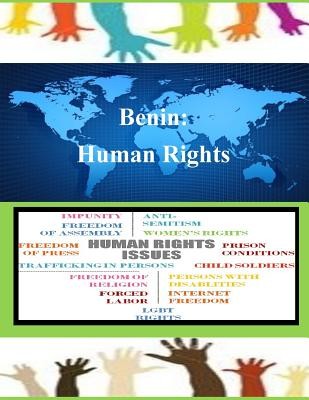
- We will send in 10–14 business days.
- Author: United States Department Of Defense
- Publisher: CreateSpace Independent Publishing Platform
- Year: 2014
- Pages: 28
- ISBN-10: 1502826607
- ISBN-13: 9781502826602
- Format: 21.6 x 28 x 0.2 cm, minkšti viršeliai
- Language: English
- SAVE -10% with code: EXTRA
Reviews
Description
Benin is a constitutional democracy. In 2011 President Boni Yayi won a second, and final, five-year term in multi-party elections. In the 2011 legislative elections, President Yayi's supporting coalition, Cowry Force for an Emerging Benin, won 41 of 83 seats in the National Assembly and formed a majority coalition with the Renaissance of Benin Party and other minor supporting parties for a total of 61 seats. As a result, the coalition controlled six of the seven seats in the Bureau of the National Assembly. International observers viewed the presidential and legislative elections as generally free, fair, and transparent. Civilian authorities generally maintained effective control over security forces. Security forces committed some human rights abuses. The major human rights problems included police use of excessive force; violence and discrimination against women and girls, including female genital mutilation/cutting (FGM/C); and harsh prison conditions. Other human rights problems included arbitrary arrest and detention and prolonged pretrial detention. Abuse of women and children, including infanticide; trafficking in persons; vigilante violence; and child labor remained problems. Although the government made an effort to control corruption and abuses, including by prosecuting and punishing public officials, officials sometimes engaged in corrupt practices with impunity.
- Author: United States Department Of Defense
- Publisher: CreateSpace Independent Publishing Platform
- Year: 2014
- Pages: 28
- ISBN-10: 1502826607
- ISBN-13: 9781502826602
- Format: 21.6 x 28 x 0.2 cm, minkšti viršeliai
- Language: English English
Benin is a constitutional democracy. In 2011 President Boni Yayi won a second, and final, five-year term in multi-party elections. In the 2011 legislative elections, President Yayi's supporting coalition, Cowry Force for an Emerging Benin, won 41 of 83 seats in the National Assembly and formed a majority coalition with the Renaissance of Benin Party and other minor supporting parties for a total of 61 seats. As a result, the coalition controlled six of the seven seats in the Bureau of the National Assembly. International observers viewed the presidential and legislative elections as generally free, fair, and transparent. Civilian authorities generally maintained effective control over security forces. Security forces committed some human rights abuses. The major human rights problems included police use of excessive force; violence and discrimination against women and girls, including female genital mutilation/cutting (FGM/C); and harsh prison conditions. Other human rights problems included arbitrary arrest and detention and prolonged pretrial detention. Abuse of women and children, including infanticide; trafficking in persons; vigilante violence; and child labor remained problems. Although the government made an effort to control corruption and abuses, including by prosecuting and punishing public officials, officials sometimes engaged in corrupt practices with impunity.


Reviews